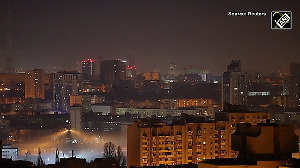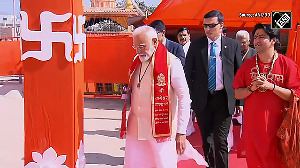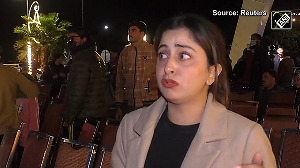In an order likely to act as a precedent for those jailed under the stringent Unlawful Activities (Prevention) Act (UAPA), a Special National Investigation Agency court in Guwahati on Thursday released Assam legislator Akhil Gogoi and his associates for his alleged role in the violent anti-Citizenship (Amendment) Act stir in the state and observed there was nothing to indicate 'talk of blockade' threatened the country's economic security or was 'a terrorist act'.

Gogoi, an independent MLA from Sivasagar constituency, walked out of the Gauhati Medical College Hospital, where he was being treated, after the special NIA court judgment.
The Raijor Dal chief and his associates were accused in two cases registered in Chandmari and Chabua, under the UAPA for their alleged role in violent protests in Assam against the Citizenship (Amendment) Act in 2019.
"Truth has finally prevailed, though no efforts were spared to keep me behind the bars," he told reporters after his release.
Describing the judgement as 'historic and exemplary', Gogoi said that Special NIA Judge Pranjal Das has established the independence of the judiciary.
Judge Das said that Gogois speeches and statements do not make out any offence under the UAPA Act of conspiracy, abetment, advise, advocacy of a terrorist act.
Some 13 cases were filed against him in connection with the CAA protests.
The Court, while dismissing all charges against Gogoi, observed that in none of his speeches did it find any incitement to violence though it is a different matter that during the protests in the state in December, 2019 against the Citizenship Amendment Act led by various organisations, incidents of vandalism, damage and destruction of property unfortunately did take place.
It said that from his speeches available on record, he 'cannot be charged with any incitement to violence, there are also no materials to link him with vandalism and damage to property that took place; rather he is exhorting people not to indulge in violence and seems to be doing so fervently'.
Similarly, the judge observed that there is no material to indicate that any stoppage of shipments of natural resources out Assam occurred as a result of any of Gogoi's statements as was made out while framing terror charges against the leader.
"Only on the basis of the statements of some witnesses about Gogoi speaking about blockade and closure, it cannot be said that there are prima facie materials to indicate that such talk of blockade was with an intention to threaten the economic security of India so as to constitute an offence of a terrorist act," he observed.
The judge added, "That would not be a correct prima facie deduction, for the purpose of framing charges."
Even if statements of some witnesses attributing talk of shut down etc. to Gogoi are accepted on face value, it cannot said that there is a prima facie case for inferring that he 'advocated or advised causing death, destruction of properties or disruption of essential supplies with the use of bombs, dynamite or other explosive substances or by any other means of whatever nature, with the intention of threatening the unity, integrity, security, economic security, or sovereignty of India or with intent to strike terror or likely to strike terror', Das said.
"Therefore, I am of the considered view that these statements and conversations do not make out any offence u/s 18 UA (P) Act of conspiracy, abetment, advise, advocacy of a terrorist act defined in S.15 of the Act," the Judge stated.
The Court said ordinary bandhs, blockades, shut downs as part of protests, unaccompanied by incitement to violence could not come within the ambit of 'threatening the economic security of India'.
It observed 'the said expression' has a much graver connotation.
Protests in a democracy are sometimes seen to take the form of blockades also, even causing inconvenience to citizens but it is doubtful whether such blockades for temporary periods, if unaccompanied by any incitement to violence, would constitute a terrorist act within Section 15 of the UA (P) Act.
Gogoi, after his release said he will forever remain grateful to all those who donated whatever amount they could to meet his legal costs, and to get him elected as an MLA from jail.
"I had no money, was labelled a terrorist, an anti-national by the government but people donated of free-will and the people of Sivasagar elected me as their representative. I will forever remain grateful to them for this," he said.
Gogoi became the first jailed leader in Assam to win an assembly election earlier this year.
The investigating agency had on June 29 presented a 'protected witness', in the Chandmari case and filed an additional charge sheet against Gogoi in the special NIA court.
Earlier on June 22, Gogoi and two of his associates -- Jagajit Gohain and Bhupen Gogoi -- were cleared of charges in the Chabua case.
Charges were framed against his fourth associate Bhaskarjit Phukan under Section 144 Indian Penal Code, and the case has been
now transferred to the court of the Chief Judicial Magistrate, Dibrugarh.
Gogoi was arrested on December 12, 2019 from Jorhat, during the height of the anti-CAA protests in the state, as a 'preventive measure' in view of the deteriorating law and order situation in the state and his three associates were taken into custody the next day.
They were later handed over to the NIA and booked under UAPA for their alleged role in the violent protests and their possible links with Maoists.
CAA seeks to grant citizenship to persecuted minorities -- Hindu, Sikh, Jain, Buddhist, Parsi and Christian -- from Pakistan, Bangladesh and Afghanistan who had come to India on or before December 31, 2014.
Anti-CAA agitators in Assam claim that the legislation will bring about a demographic change in the northeastern state and reduce indigenous population to a minority.











 © 2025
© 2025